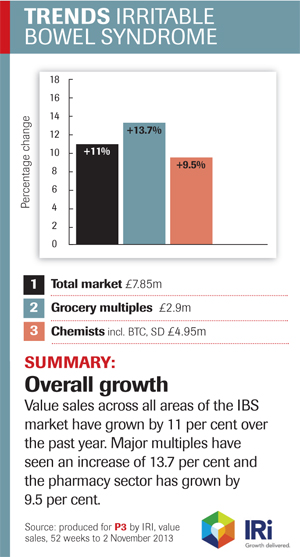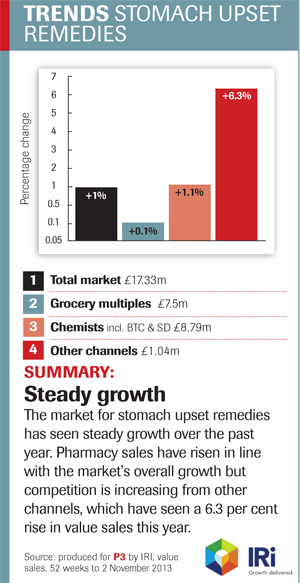Beating the bloat
In OTC
Follow this topic
Bookmark
Record learning outcomes
 Research suggests many people will be suffering from tummy trouble following the winter holiday season. Pharmacy is ideally situated to provide them with the right solution
Research suggests many people will be suffering from tummy trouble following the winter holiday season. Pharmacy is ideally situated to provide them with the right solution
According to the British Dietetic Association, many people eat more than 6,000 calories on Christmas day alone €“ about three times as many as they need. Overindulgence on rich food and alcohol can play havoc with the digestive system.
It's not surprising that a recent Care poll of 5,000 UK adults by Thornton & Ross revealed that 28 per cent of British people have been hit by tummy trouble over the winter holiday season. The Care survey found that 37 per cent of people have suffered from bloating, 41 per cent said overindulging made them feel lethargic, 27 per cent felt self-conscious at social occasions and 32 per cent wear loose-fitting clothes as a result.
Troublesome symptoms
According to Louise White, marketing manager for Zantac at Omega Pharma, indigestion and heartburn are common in the winter months, particularly during Christmas and the New Year. 'Both these conditions can be easily treated with OTC remedies,' she says.
'Pharmacy teams should seek to educate customers about the different digestive health conditions and available treatment options. By engaging the customer in conversation about their symptoms, the pharmacist and/or pharmacy assistant can feel confident they are providing them with the right solution. Merchandising digestive products alongside other winter health treatments will help encourage conversations about general winter health and wellbeing, enhancing the opportunities for linked sales.'
H2 blockers such as Zantac can be used both as a preventive measure and provide effective relief from heartburn and indigestion for up to 12 hours. 'Omega Pharma recently launched a £1.2 million campaign called 'Generations of Care', which is tapping into the consumer demand for credible, trusted British brands,' says Ms White. 'Zantac 75 Relief, part of the Generations of Care portfolio, has been a family favourite for more than 30 years. Print advertisements for Zantac are appearing in popular consumer weeklies and monthlies, and a print trade advert, which also includes Buttercup Cough Syrup, Metatone Tonic, TCP Antiseptic Liquid, Hedex and Abidec Multivitamins, has been featured within the pharmacy press. The campaign will run until March 2014.'
Lifestyle changes
 A survey to support National Gut Week, run in association with the Irritable Bowel Syndrome (IBS) Network, found that 34 per cent of people don't eat three square meals a day and instead snack to fill their stomachs. Gastroenterologist Dr Nick Read, medical advisor to the IBS Network, warns that these bad habits can lead to bloating, abdominal pain and bowel upset.
A survey to support National Gut Week, run in association with the Irritable Bowel Syndrome (IBS) Network, found that 34 per cent of people don't eat three square meals a day and instead snack to fill their stomachs. Gastroenterologist Dr Nick Read, medical advisor to the IBS Network, warns that these bad habits can lead to bloating, abdominal pain and bowel upset.
Stress is another major trigger of digestive symptoms. However, according to McNeil Products Ltd, the link between food, mood and occurrences of diarrhoea is not always recognised. An Imodium survey among frequent diarrhoea sufferers found 65 per cent of the respondents state diarrhoea adversely impacts on their normal daily activities, with more than half regarding diarrhoea to be worse than or as bad as a migraine. Yet more than 50 per cent of occurrences are still left untreated, even when appropriate self-medication could relieve the symptoms and help avoid social disruption. Dr Read says that sometimes the most effective way to understand the root of the problem is for the patient to keep a diary of eating and lifestyle habits, so that any patterns and causes can be identified when episodes occur.
Imodium's new MyRhythm is a brand new online program and an iTunes and Google Play App) that will enable pharmacy customers to track their digestive health issues discreetly and with ease. Key features include an interactive food and mood diary and a comprehensive database of more than 20,000 food items and recipes to choose from, allowing patients to specify ingredients and not just food types. The programme can identify trends showing the foods, drinks or moods associated with a digestive upset or episode and personalised reports for patients to download and print, so they can have them to hand during discussions with their doctor or healthcare professional.
Probiotic top-up
Increasingly, research is demonstrating that probiotics can help with digestive symptoms, and intestinal bacteria seem to be important in many gastrointestinal (GI) conditions,  including irritable bowel syndrome and antibiotic-associated diarrhoea. A new reference guide, supported and facilitated by the European Society for Primary Care Gastroenterology (ESPCG), provides the first practical consensus on the role of specific probiotics in the management of lower GI symptoms in adults.
including irritable bowel syndrome and antibiotic-associated diarrhoea. A new reference guide, supported and facilitated by the European Society for Primary Care Gastroenterology (ESPCG), provides the first practical consensus on the role of specific probiotics in the management of lower GI symptoms in adults.
The guide was launched in October during the United European Gastroenterology (UEG) Week 2013. According to the ESPCG, the beneficial role of probiotics has been shown in several studies, and doctors are increasingly being asked by patients with GI symptoms to recommend specific probiotics. However, until now, there has been no evidence-based reference guide on the role and effectiveness of specific probiotics and their clinical use.
Pharmacies are well placed to advise on suitable probiotic products for digestive symptoms. Bio-Kult's Natalie Lamb says the gut microflora balance can be compromised during the winter months by infections, antibiotics, stress or comfort eating during cold spells.
'An effective solution to restoring gut flora levels and to support the immune system is to take a good multi-strain probiotic supplement,' she says. 'We have just unleashed some fantastic point of sale material to help pharmacists promote Bio-Kult in store. These include vibrant window stickers and giant packs to help retailers create some exciting window displays. We are currently conducting a London Underground poster campaign promoting Bio-Kult and we will be re-running our prescription bag campaign in January. We also provide extensive support across the country with regards to training, where qualified nutritional therapists and our in-house doctor can come and conduct training in the pharmacy regarding the use of probiotics and how the Bio-Kult range works.'
Herbal relief
The Henry Potter Advisory Committee (HPAC)'s research for Potter's Herbals shows that most people try to change their diet to some extent to relieve their digestive symptoms. This usually involves avoiding or cutting back on carbonated drinks, salt, fatty foods, dairy products, ready meals and takeaways and rich or spicy foods.
According to the HPAC survey, more than half of Britons drink lots of water to relieve uncomfortable digestive symptoms while 17 per cent drink plenty of herbal tea. In particular, 20 per cent of 25- to 34-year-olds feel herbal teas ease their symptoms compared with just 13 per cent of those in the 55 to 60 age group.
Yet despite the popularity of herbal teas and the known efficacy of traditional herbal remedies for poor digestion, only one in 20 people regularly takes a herbal remedy for digestive health, although women are much more likely to drink herbal tea than men.
Dr Chris Etheridge from the HPAC says: 'Many herbs, such as senna, psyllium, dandelion, peppermint and buckthorn, have a strong, trusted heritage in naturally aiding and assisting digestive health, and these can be found carefully combined in the Potter's Herbals range.'
Comment
 Bipin Patel, pharmacist at Broadway Pharmacy, Bexleyheath 'Digestive health is a large category in the pharmacy, especially in January when people have overindulged. We advise customers to try and avoid certain things so for indigestion, for example, we'd say eat little and often, keep portion sizes small and don't eat late at night. For diarrhoea our advice is to eat small portions of light and bland foods. For bloatedness, eat little and often but also keep an eye on what you're eating to get better. Full product knowledge is what's important so we make sure that the team is aware of what products they can offer. The main challenge in the digestive health category is an underlying condition that might be mimicking the symptoms of a more common one.'
Bipin Patel, pharmacist at Broadway Pharmacy, Bexleyheath 'Digestive health is a large category in the pharmacy, especially in January when people have overindulged. We advise customers to try and avoid certain things so for indigestion, for example, we'd say eat little and often, keep portion sizes small and don't eat late at night. For diarrhoea our advice is to eat small portions of light and bland foods. For bloatedness, eat little and often but also keep an eye on what you're eating to get better. Full product knowledge is what's important so we make sure that the team is aware of what products they can offer. The main challenge in the digestive health category is an underlying condition that might be mimicking the symptoms of a more common one.'
 Ramesh Patel, Brownes Chemist, Abbey Wood, London 'If a customer comes in with a digestive problem we would advise them to try a product such as Gaviscon to see if the indigestion subsides in a day or two. If not, we advise them to either come back to us or to see their GP. We will also offer support and advice for people with coeliac disease or IBS. We give our own staff training in this category, but some of the brand companies offer good training as well. We help staff to recognise the signs that a patient might be suffering from excess acid for example. Having visible displays of digestion-related products is a good way to improve over-the-counter sales in this category.'
Ramesh Patel, Brownes Chemist, Abbey Wood, London 'If a customer comes in with a digestive problem we would advise them to try a product such as Gaviscon to see if the indigestion subsides in a day or two. If not, we advise them to either come back to us or to see their GP. We will also offer support and advice for people with coeliac disease or IBS. We give our own staff training in this category, but some of the brand companies offer good training as well. We help staff to recognise the signs that a patient might be suffering from excess acid for example. Having visible displays of digestion-related products is a good way to improve over-the-counter sales in this category.'
 Nawaz Mohamed, locum pharmacist, Sheffield 'Customers with digestive health problems need to be given dietary and lifestyle advice that will help to reduce and manage their symptoms. Patients who experience indigestion symptoms at night are advised to raise their head in bed with an extra pillow. Referrals should be made when patients are experiencing severe abdominal pain, along with other symptoms or if the pain has been prolonged over several days. Staff know that patients should be referred if there is blood or mucus in their stools, have experienced weight or appetite loss. Patients who are middle aged with symptoms of indigestion should also be referred, as well as those with pain radiating down the arm or into the back or those who have difficulty breathing.'
Nawaz Mohamed, locum pharmacist, Sheffield 'Customers with digestive health problems need to be given dietary and lifestyle advice that will help to reduce and manage their symptoms. Patients who experience indigestion symptoms at night are advised to raise their head in bed with an extra pillow. Referrals should be made when patients are experiencing severe abdominal pain, along with other symptoms or if the pain has been prolonged over several days. Staff know that patients should be referred if there is blood or mucus in their stools, have experienced weight or appetite loss. Patients who are middle aged with symptoms of indigestion should also be referred, as well as those with pain radiating down the arm or into the back or those who have difficulty breathing.'
